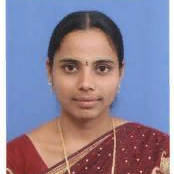
Vimala. C
Work place: Department of Computer Science, Avinashilingam Institute of Home Science and Higher Education for Women, Coimbatore – 641043, Tamil Nadu, India.
E-mail: vimalac.au@gmail.com
Website:
Research Interests: Speech Synthesis, Speech Recognition, Pattern Recognition, Computer systems and computational processes
Biography
Dr.Vimala.C done her Ph.D in the Department of Computer Science, Avinashilingam Institute for Home Science and Higher Education for Women. She has more than 2 years of teaching experience and 3 years of research experience. She worked as a Project Fellow for the UGC Major Research project. Her area of specialization includes Speech Recognition, Speech Synthesis and speech signal enhancement. She has 16 publications at National and International level conferences and journals.
Author Articles
Efficient Acoustic Front-End Processing for Tamil Speech Recognition using Modified GFCC Features
DOI: https://doi.org/10.5815/ijigsp.2016.07.03, Pub. Date: 8 Jul. 2016
Giving suitable input and features are always essential to obtain better accuracy in Automatic Speech Recognition (ASR). The type of signal and feature vectors given as an input is highly essential as the pattern matching algorithms strongly depends on these two components. The primary goal of this paper is to propose a suitable Pre-processing and feature extraction techniques for speaker independent speech recognition for Tamil language. The five pass Pre-processing and three types of modified feature extraction techniques are introduced using Gammatone Filtering and Cochleagram Coefficients (GFCC) to achieve better recognition performance. The modified GFCC features using multi taper Yule walker AR power spectrum, combinational features using Formant Frequencies (FF), combined frequency warping and feature normalization techniques using Linear Predictive Coding (LPC) and Cepstral Mean Normalization (CMN) are investigated. The experimental results prove that the proposed techniques have produced high recognition accuracy when compared with the conventional GFCC feature extraction technique.
[...] Read more.Other Articles
Subscribe to receive issue release notifications and newsletters from MECS Press journals